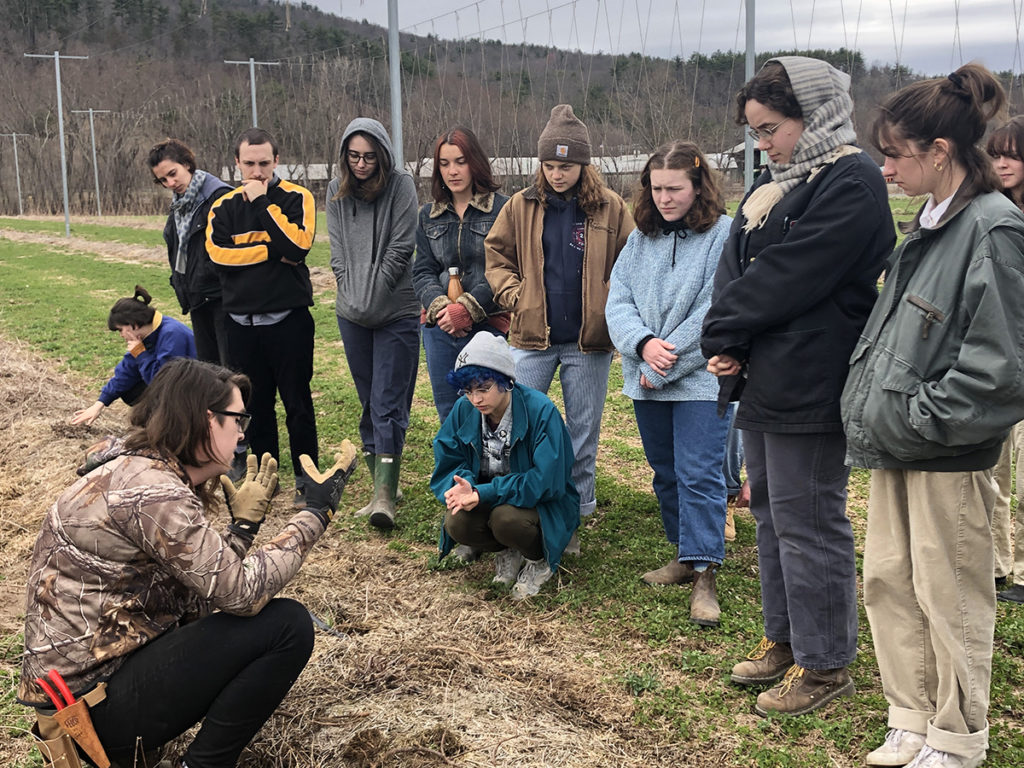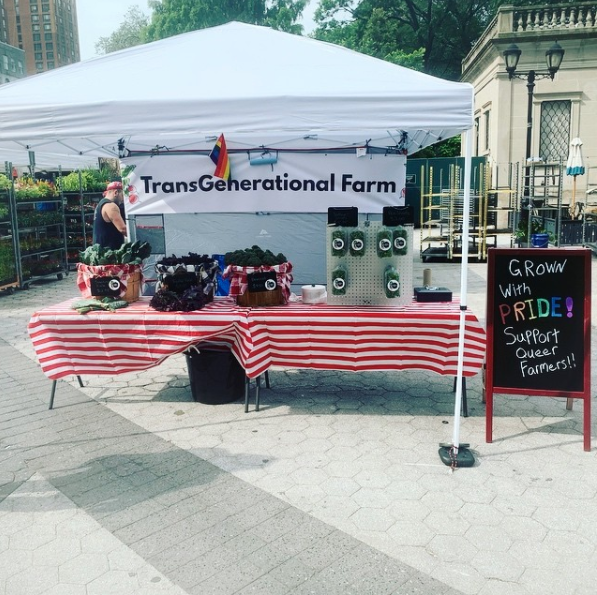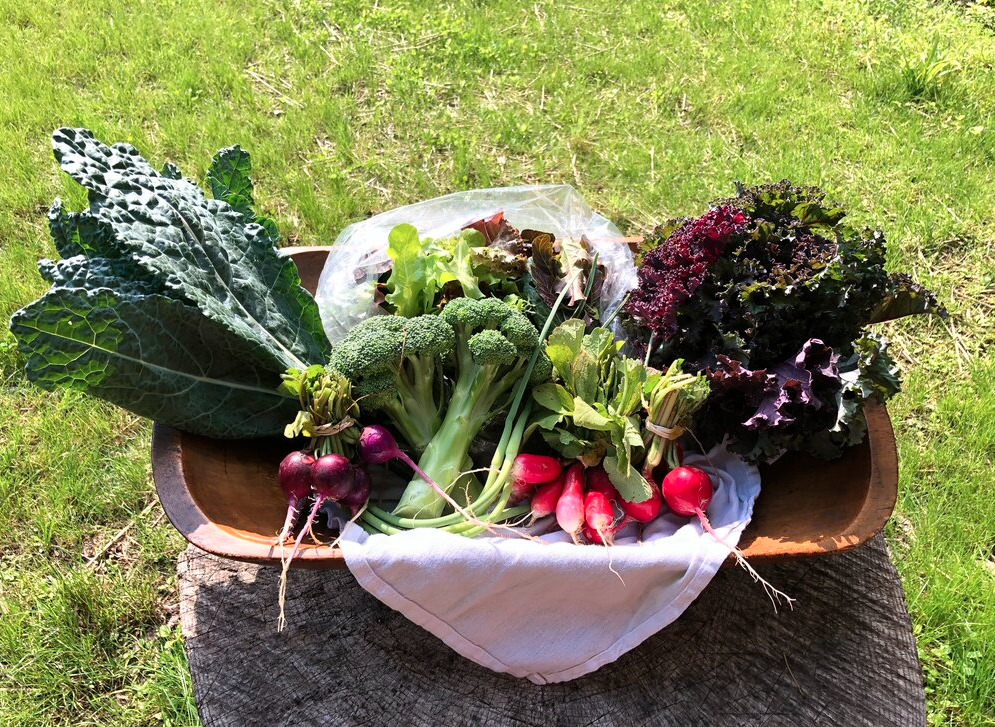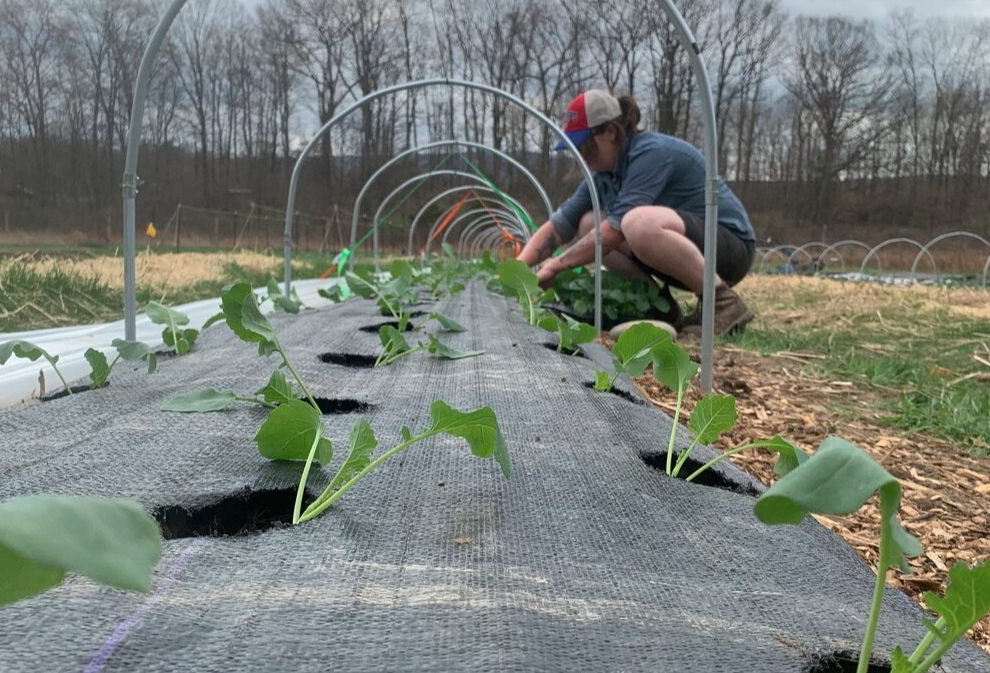Spanish translation below /traducción en español abajo
JAYNE HENSON TAKES HER GROWING SAVVY TO NEW FIELDS
For Jayne Henson, the challenges and opportunities of the season ahead don’t just come with juggling the usual hustle and bustle of the growing season but a whole new chapter. She is now devoting herself full-time to a new venture of her own after completing her tenure with the Farm Hub’s ProFarmer Training Program in the spring.

Since the start of the year, she’s been setting up shop at Arrowood Farms Brewery & Distillery in Accord NY as the farm manager. Under the arrangement, Arrowood is hosting Jayne’s existing farm/enterprise TransGenerational Farm (which she launched in 2019) and in exchange, she is growing vegetables for Arrowood’s kitchen and managing the existing hop yard. It is the first time Arrowood has cultivated an organic vegetable farm on site.
While she has already constructed infrastructures such as a hoop house and greenhouse, much work remains to be done for Jayne to continue building her enterprise.
Farmer and entrepreneur
Jayne feels well prepared to tackle her dual role as a farmer and entrepreneur. In 2017 she joined the ProFarmer Training Program at the Farm Hub, where the curriculum combined field and classroom learning. Each ProFarmer was also given an opportunity to focus on a specific area of interest, in her case hops.
“I did a lot of work on hops when I was at Farm Hub so this is a great opportunity to put the work techniques into practice,” says Jayne. The hop yard also served as a learning platform for pest and disease management.
“One thing I really focused on at Farm Hub was managing downy mildew and I’ll be taking those practices and putting them to use in the hop yard there [Arrowood],” she says. She has learned from Mother Nature’s curveballs such as discovering the European corn borer, a common pest that mainly threatens sweet corn varieties, in the hops.

“I really wasn’t expecting it at all, I was scouting for things like the two-spotted spider mite, and the potato leafhopper. The European corn borer was kind of a surprise,” she said.
Simultaneously she had her eyes set on running her own farm. “That was the whole motivation for me of doing the ProFarmer program,” she says. The right timing and opportunity came in 2019. Through the program, she obtained a mentorship at SustainAbility Farm. This led to SustainAbility Farm leasing land to Jayne, allowing her to grow her own produce, and so TransGenerational Farm was born. She launched her business at the GrowNYC-organized Union Square Greenmarket and also offered community-supported agriculture (CSA).
When the pandemic was recognized in the spring of 2020, Jayne was like most small farmers who found themselves having to brainstorm on how to pivot to keep their businesses afloat. As the customer base at the Union Square Greenmarket fizzled and her customer base shifted almost entirely to CSA, Jayne found herself spending considerable time in transit delivering vegetables to her customer base in New York City.
Last summer she returned to the farmers market realm, but this time she set up at the Kingston Farmers Market. In many ways, it was a breath of fresh air.
“It was great. Doing a closer local farmer’s market was a lot less stressful for me. It was more affordable and accessible and allowed me to make connections locally,” she says. She also made connections with local businesses in need of fresh produce including Harana Market, an Asian grocery store that opened in Woodstock earlier this year.

Farmer and advocate
While TransGenerational is a business, it is also a platform for advocacy when it comes to the LGBTQ community. As a transgender individual, Jayne notes there is a tremendous lack of LGBTQ representation in agriculture in the U.S. She was born and raised in Ulysses, Kansas, where agriculture is the main industry.
“I grew up around farming and I grew up doing 4-H. My grandparents farmed and my uncle farmed and raised beef cattle. When my uncle passed away while I was in college, my folks took up his part of the farm,” she says. “My folks are still farming that land and it’s been in the family quite a while–one of my sisters and her husband raise beef cattle so it’s something I’ve always been around.” While farming felt like a natural fit, she felt out of place in Ulysses.
“So I moved to New York City and I found that at the end of the day I was still a country girl. I just didn’t want to be in the city; I wanted to get back to these things I really love, and that prompted me to move back to rural space,” she says of her decision to move from New York City to the Hudson Valley.

Inspiration and motivation
Agriculture combines some of her biggest passions, including being an entrepreneur.
Being kind of a solo farmer, everything has to be systems-oriented for a good workflow,” she explains. For example, to reduce tillage and manage weed pressure, she has a system in which she plants the seeds on beds, blankets them with mulch, and then covers them with reusable landscape fabric.
Indeed, farming is multifaceted and utilizes a number of her skills. She rarely has a dull moment.
“I really like growing food for people and that feels really fulfilling in a lot of ways. Farming engages so many things I love and it’s challenging in so many ways–you need to do customer relations, the website, sales, auto mechanics and be a welder, a plumber, and electrician. These are all skillsets that I’ve grown into my entire life,” she says. “Agriculture is the best place for someone like me.”
– Amy Wu
Jayne Henson lleva su creciente conocimiento a otros campos
Para Jayne Henson, una joven agricultora, los desafíos y las oportunidades de la temporada que se avecina no solo incluyen hacer malabares en el ajetreo habitual de la temporada de cultivos, sino un capítulo completamente nuevo. Ahora se dedica a tiempo completo a un nuevo emprendimiento propio luego de completar su entrenamiento en el Programa de Capacitación ProFarmer de Farm Hub en la primavera.

Desde principios de año, se estableció en Arrowood Farms Brewery & Distillery en Accord, Nueva York, como gerente general del rancho. Según el acuerdo, Arrowood patrocina el rancho/empresa existente de Jayne, TransGenerational Farm (que lanzó en el 2019) y, a cambio, ella cultiva verduras para la cocina de Arrowood y administra la parcela de lúpulo. Es la primera vez que Arrowood tiene una finca de verduras orgánicas en el lugar.
Si bien ya ha construido infraestructura, como un invernadero de arcos y un invernadero, queda mucho trabajo por hacer para que Jayne continúe el desarrollo de su empresa.
Agricultora y emprendedora
Jayne se siente bien preparada para afrontar su doble papel como agricultora y emprendedora. En el 2017, se unió al Programa ProFarmer de Farm Hub, donde el plan de estudios combinaba el aprendizaje en el campo y en el aula. A cada ProFarmer también se le dio la oportunidad de enfocarse en un área de interés específica, en su caso, el lúpulo.
“Trabajé mucho con el lúpulo cuando estaba en Farm Hub, así que esta es una gran oportunidad para poner en práctica las técnicas de trabajo”, dice Jayne. La parcela de lúpulo sirvió como una plataforma de aprendizaje para el manejo de plagas y enfermedades.
“Una cosa en la que me concentré mucho en Farm Hub fue el manejo del mildiu velloso y tomaré esas prácticas y las usaré en la parcela de lúpulo allí en [Arrowood]”, dice ella. Ha aprendido de los desafíos sorpresivos de la madre naturaleza como el descubrimiento del barrenador europeo del maíz en el lúpulo —una plaga común que amenaza principalmente a las variedades de maíz dulce.

“Realmente no me lo esperaba en lo absoluto, estaba buscando cosas como la araña roja y el saltahojas verde. El barrenador europeo del maíz fue una especie de sorpresa”, dijo.
Al mismo tiempo, tenía los ojos puestos en administrar su propio rancho. “Esa era toda mi motivación para participar en el programa ProFarmer”, dice ella. En el 2019, llegó el momento y la oportunidad. A través del programa, obtuvo asesoría de SustainAbility Farm. Esto llevó a SustainAbility Farm a arrendarle tierras a Jayne, lo que le permitió cultivar productos agrícolas, y así nació TransGenerational Farm. Lanzó la parte de ventas de su negocio en Union Square Greenmarket organizado por GrowNYC y también ofreció Agricultura Apoyada por la Comunidad (CSA, por sus siglas en inglés).
Cuando se declaró la pandemia en la primavera del 2020, Jayne, como la mayoría de los pequeños agricultores, se vio obligada a pensar en cómo adaptarse para mantener a flote su negocio. A medida que la clientela de Union Square Greenmarket se esfumaba y sus clientes cambiaron casi por completo a CSA, Jayne comenzó a pasar mucho tiempo en tránsito entregando verduras a su clientela en la ciudad de Nueva York.
El verano pasado regresó al ámbito del mercado de agricultores, pero esta vez se instaló en Kingston Farmers Market. En muchos sentidos, fue un soplo de aire fresco.
“Fue genial. Participar en un mercado agrícola local más cercano fue mucho menos estresante para mí. Era más asequible y accesible y me permitió hacer conexiones a nivel local”, dice ella. También hizo conexiones con empresas locales que necesitaban productos frescos incluida Harana Market, una tienda asiática de comestibles que abrió en Woodstock a principios de este año.

Agricultora y defensora
Si bien TransGenerational es un negocio, también es una plataforma para la defensoría a favor de la comunidad LGBTQ. Como persona transgénero, Jayne señala que hay una tremenda falta de representación LGBTQ en la agricultura en los Estados Unidos. Ella nació y se crió en Ulysses, Kansas, donde la agricultura es la industria principal.
“Me crié en el ámbito de la agricultura y participé en el programa 4-H. Mis abuelos eran agricultores y mi tío era agricultor y criaba ganado de carne. Luego mi tío falleció mientras yo estaba en la universidad y mis padres se ocuparon de su parte del rancho”, dice ella. “Mis padres están cultivando esa tierra y ha estado en la familia bastante tiempo —una de mis hermanas y su esposo crían ganado de carne, así que es algo que siempre he tenido cerca”. A pesar de que la agricultura se sentía como algo natural para ella, se sentía fuera de lugar en Ulysses.
“Así que me mudé a la ciudad de Nueva York y encontré que al final del día seguía siendo un chica del campo. Simplemente no quería estar en la ciudad. Quería regresar a estas cosas que realmente amo y eso me impulsó a regresar al espacio rural”, dice ella sobre su decisión de desarraigarse de la ciudad de Nueva York y trasplantarse al Valle de Hudson.

Inspiración y motivación
La agricultura combina algunas de sus mayores pasiones, incluida ser una empresaria.
“Al ser una especie de agricultora solitaria, todo tiene que estar orientado a los sistemas para tener un buen flujo de trabajo”, explica ella. Por ejemplo, para reducir la labranza y controlar la mala hierba, tiene un sistema en el que siembra las semillas en camas, las cubre con mantillo y luego las tapa con tela de jardinería reutilizable.
Ciertamente, la agricultura es multifacética y utiliza varias de sus destrezas. Rara vez tiene un momento aburrido.
“Me gusta mucho cultivar alimentos para las personas y se siente realmente satisfactorio en muchos sentidos. La agricultura involucra un montón de cosas que me encantan y es un desafío de muchas maneras —tienes que relacionarte con los clientes, hacer la página web, las ventas, mecánica automotriz y ser soldadora y plomera y electricista. Todas estas son destrezas con las que me crié y desarrollé durante toda mi vida”, dice ella. “La agricultura es el mejor lugar para alguien como yo”.
– Amy Wu
